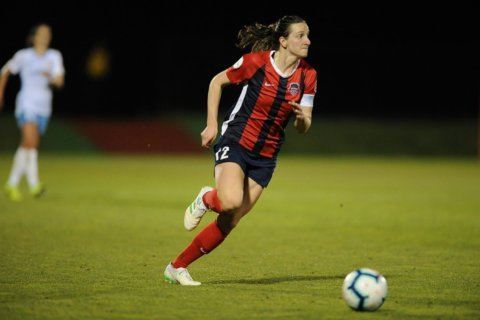For a tight-knit team with a seemingly endless supply of inside jokes, it was like the obvious punchline had never occurred to them until right at that moment, on stage, being interviewed about their World Cup experience. When asked about Rose Lavelle’s goal that put the U.S. Women’s National Team up 2-0 over the Netherlands in the final, essentially sealing their victory, teammate and roommate Mallory Pugh was only surprised by her unintentional pun.
“I had a feeling like that was her time and that’s exactly what she did — she ‘Rose’ to the occasion,” said Pugh, immediately bursting into laughter upon realizing it.
Monday was a time to smile and bask in the increased media awareness that only a World Cup victory brings, but also to try once again to capture that momentum and bottle it up to help professional women’s soccer in the United States.
After training at FedEx Field, the half dozen Washington Spirit players who took part in the World Cup and captain Andi Sullivan held court in front of a couple dozen local, national and international media members to talk about the experience and what it meant for the future of the game at home.

“I think we were both really, really excited to getting back playing here,” said Lavelle, a midfielder who enjoyed a star turn and won the Bronze Ball as the third-best player in the Women’s World Cup this summer.
“The support locally, nationally — and, honestly, really has been amazing. I feel like we were everyone’s most-hated team and most-loved team at the same time,” Lavelle said.
The most-loved part extends even to those on stage, who had to watch the U.S. ascend to the top of the world once again. As the most public faces (and names attached to the lawsuit) fighting for equal pay, and support for facilities and youth programs, a victory for them on the world stage is, necessarily, a victory for women’s soccer players everywhere, another swell in the rising tide.
“I couldn’t name a country that isn’t happy and glad to see what the Americans are doing,” said Chloe Logarzo, who played for her native Australia this summer.
Cheyna Matthews, who played for a Jamaican squad that struggled to raise enough funds just to be able to make it to and play in their first World Cup, is hopeful that the American success will spark action in her federation as well.
“With a fellow CONCACAF team having this kind of success, just raising the awareness for women in general, I think that’s put a good kind of pressure on the (Jamaican Football Federation) to not only talk about the things they want to do for us, but to make those things happen,” she said.
Perhaps the crowd might still have chanted “equal pay!” after some result other than a U.S. victory in the tournament final, but it was an unwavering show of support for the specific women who have most publicly fought to elevate the sport. It was a chant the players heard, Lavelle confirmed.
“I think it’s past the point of a conversation,” she said. “We deserve equal pay. It’s as simple as that.”
Later, Lavelle expanded upon the other areas she saw as needing institutional support in order to strengthen the game both at home and abroad.
“It’s not just about paying us; it’s about funding across the board with everything. FIFA putting more money into the women’s game. The federations putting more money into the women’s game and the youth teams. I think there’s a lot of different areas that need to improve beyond pay,” she said.
As far as a potential visit to the White House, Lavelle made it clear that it was not a high priority at this point. “We haven’t really heard anything about it. I don’t think we’re too concerned,” she said. “We celebrated, and now we’re focusing on the NWSL season.”
Part of that focus includes a new 14-game TV deal with ESPN, which has not broadcast the league since 2014.
Games will appear on ESPN2 and ESPN News, though, not the primary channel. With five more home games — including two at Audi Field on Aug. 24 and Sept. 14 — the Spirit will also have a couple more chances to draw upon the spotlight of the World Cup as they make a playoff push.
Though Pugh made it clear she was thankful a new TV deal is in place, after the previous deal with A+E Networks was cut short, she vented some of her frustrations about the general priorities of the sports broadcast media.

“I think any exposure we can get is wonderful,” Pugh said. “It has been frustrating that, sometimes, you turn on ESPN and there’s, like, corn hole (on) … I want people to see what we can do, and how great each and every one of these players is.”
A major push from an involved new owner has also been instrumental.
The players were effusive with their praise for Steve Baldwin, who bought into the Spirit ownership group this year, and who has helped not only with facilities upgrades, but in bringing in major new sponsors.
It’s a pressure players in more established leagues don’t face, but women soccer players in America have a long history of going beyond their simple performances on the field to drive interest, dating back to Mia Hamm and Julie Foudy running clinics and handing out flyers to families all across the U.S. in the months leading up to the 1999 Women’s World Cup.
Sullivan said the off-the-field work Baldwin has helped with has allowed the players to not have to divide their focus, instead allowing them to shine. “He’s kind of taken that on his shoulders, and that takes a lot off ours and enables us to just focus on what we do best, which is play,” she said.






